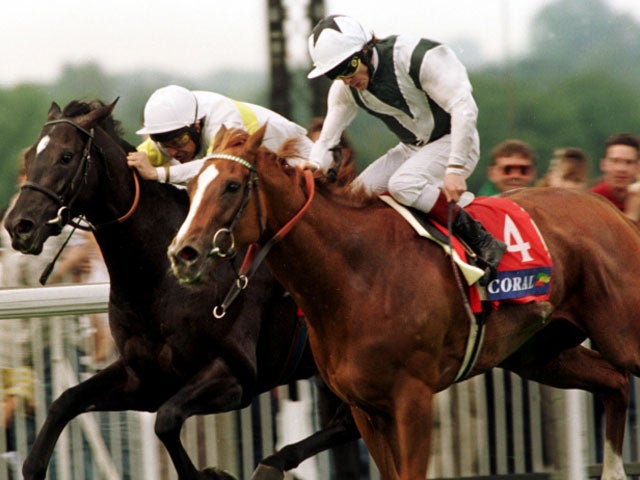Tower tries to retake the high ground for Cecil

Thirty years of hurt never stopped him dreaming. Even allowing for the dip in the fortunes of Henry Cecil in the new millennium it seems extraordinary that the most recent of the old maestro's three victories in the Eclipse Stakes came in 1978. It was a sweltering summer's day when Gunner B and Joe Mercer resisted the previous year's Arc runner-up, Balmerino, by three-parts of a length and tomorrow Cecil aims to turn the heat up again, with two of the nine runners for the 10-furlong showpiece. Phoenix Tower may well start favourite and Multidimensional is fourth market choice.
The Eclipse Stakes must have a special place in Cecil's affection, as the springboard top-level victory of his career. In 1969, his first year with a licence, he sent out Wolver Hollow to cause one of the upsets of the season by defeating odds-on Park Top. Wolver Hollow was undeniably the lesser horse but in the saddle was one Lester Piggott, who outrode, out-thought and outmanoeuvred Geoff Lewis on the great mare.
Seven years later it was Wolver Hollow's son Wollow who took the prize but he, too, needed a little help, this time from the stewards. The 2,000 Guineas winner and Derby flop was beaten squarely by Trepan, but not fairly. The French raider failed his routine dope-test and was disqualified.
But since Gunner B, luck has not been on Cecil's side. His top-class Derby winner Reference Point started at evens, but had the misfortune to run into a progressive four-year-old in Mtoto, who proved just how good he was by winning again 12 months later. Two years later he fielded the high-class filly Indian Skimmer against Nashwan and saw her not only beaten by the superb Derby winner but held out of second place by her own pacemaking stablemate, the 200-1 shot Opening Verse.
But worst of all was the experience of Bosra Sham, or should that be shambles. In a five-horse field Kieren Fallon managed to get boxed in on the 4-7 favourite and failed to catch either Pilsudski or Benny The Dip. Cecil's only runner since has been third-placed Shiva eight years ago.
The lightly raced Phoenix Tower, who races in Khaled Abdullah's colours, won his first four outings and finished second when stepped up to elite company in his two most recent, the Lockinge Stakes and Prince of Wales's Stakes. His profile is progressive but it is a rare Eclipse winner who breaks his Group One duck in the race; the last to do so was Compton Admiral in 1999.
At Newbury, his defeat by Creachadoir was narrow; at Royal Ascot he was four lengths behind Duke Of Marmalade, doing his best work at the end to pip one of tomorrow's rivals, Pipedreamer, a short-head, and has thrived since.
"The Duke won well, no question of that," said Abdullah's racing manager, Teddy Beckett, yesterday. "But we didn't have the run of the race. We were wide throughout and I think given a better passage he would have been closer, though we wouldn't have won.
"He's been a very solid horse and he's come out of Ascot really well, he is bouncing. It's very difficult to win a Group One and this is no gimme. But it's a really interesting opportunity."
The five-year-old Multidimensional, owned by the Niarchos family, is also coming on from Royal Ascot, having been worn down close home in the 12-furlong Hardwicke Stakes by Macarthur after going clear at tomorrow's distance and is, on jockey bookings (Tom Queally rides; Ted Durcan is on Phoenix Tower), the second string.
Phoenix Tower's market rival Mount Nelson – the Ballydoyle stablemate of Duke Of Marmalade and Macarthur – is one of just two in the race with a Group One success, the other being Literato. The Godolphin colourbearer, however, will not run unless it rains, leaving the race to stablemate Campanologist, the only three-year-old in the field.
The Eclipse Stakes was the brainchild of Hwfa Williams, the man who invented the pay-at-the-gate enclosed racecourse in an effort to keep out Victorian yobs. Sandown, opened in 1875, was an instant success and 11 years later staged the first £10,000 race (when the Derby was worth £4,600), specifically designed to bring the best of the generations together over the mid-distance of 10 furlongs.
The 1903 running was close to perfection; four-year-old Ard Patrick, winner of the Derby, beat the legendary filly Sceptre, who had won the other four Classics the previous year, by a neck, with the hitherto undefeated three-year-old Rock Sand, who was to go on to win the Triple Crown, in third. Sadly, with the race under pressure from the many valuable alternative opportunities now afforded the best, tomorrow's 111th running looks a pale shadow of the original ethic.
Subscribe to Independent Premium to bookmark this article
Want to bookmark your favourite articles and stories to read or reference later? Start your Independent Premium subscription today.

Join our commenting forum
Join thought-provoking conversations, follow other Independent readers and see their replies